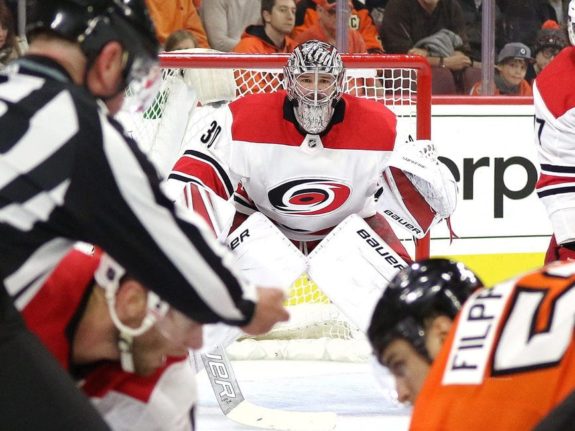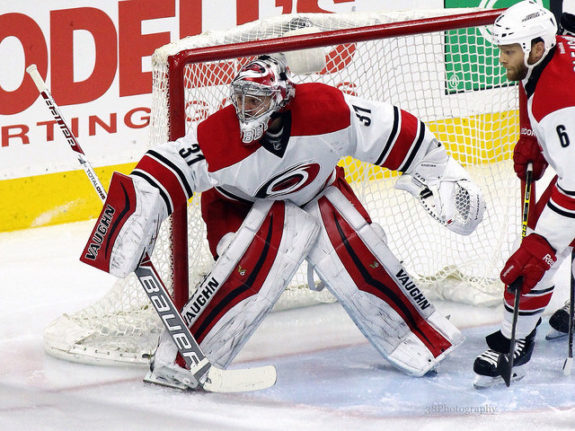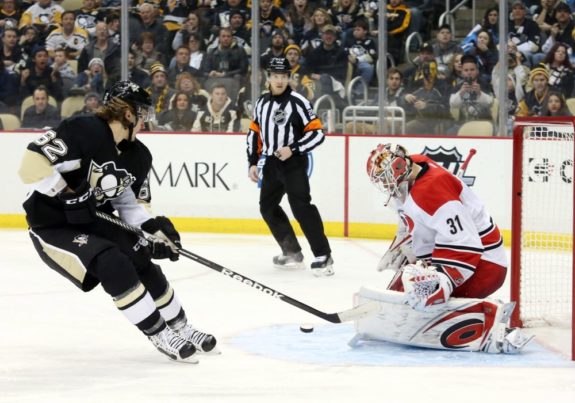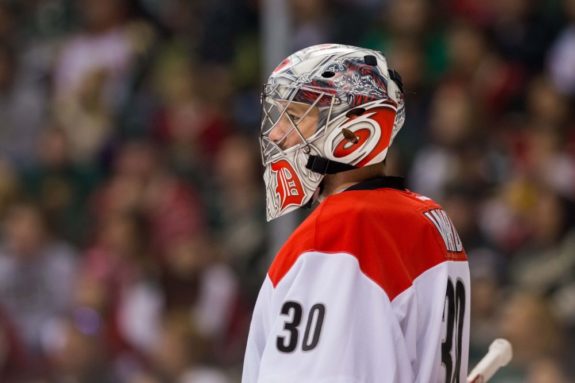On Wednesday, former Carolina Hurricanes goaltender Cam Ward returned to the team. It was not to challenge Petr Mrázek for the starting job between the pipes, but rather to hang his skates up a final time in Raleigh’s PNC Arena. After a 14-year career of peaks and valleys, Ward retired as he should, as a Hurricane.

Ward the Hurricanes Goaltender
Since leading the Hurricanes to victory and winning the Conn Smythe Trophy as the most valuable player in the 2006 Stanley Cup Final, Ward has been the Hurricanes’ goaltender. With slight exceptions at the end of his career in Raleigh, Ward was the starter, the backbone, the man. There was that brief time where coach Bill Peters had Ward and Anton Khudobin competing to be his “workhorse” but Ward emerged on top. And Peters’ workhorse he was for a long time.
In the preseason of 2014, I wrote this about Ward as the freshly minted coach Peters was deciding who to start in-goal:
His rookie performance in 2006 led many to believe that he was to be the future of the franchise in-goal – in fact he has been the starting goalie ever since. But, his injuries have seemingly kept him from rising up to the consistent level of play that fans in Raleigh expected, or hoped for, and even his future with the team has been questioned of late
Ward had suffered a couple of seasons with injuries but rose to the occasion when Peters wanted a clear starter. He played in 51 games in the 2014-15 season and notched a .910 save percentage and a 2.40 goals-against average. Khudobin played in 34 games and his numbers were a .900 save percentage and a 2.72 goals-against average. But the pundits were not convinced.

There were rumors that Ward was being courted by the Minnesota Wild in early 2015. It was mostly a distraction and by season’s end, Ward was Peters’ workhorse.
Ward, Lack, and Darling
Eddie Lack, Francis’ Strike One
The following years saw then-Hurricanes general manager Ron Francis make two moves that did not work out for the team, and which may have opened the door to his eventual demise. First, he brought in Eddie Lack from the Vancouver Canucks to replace Khudobin. Lack was not regarded as a bad goaltender. In two seasons with Vancouver, Lack (6-foot-4, 187 pounds) has posted a 34-30-9 record, with a 2.43 goals-against average and a .917 save percentage in 82 games. The overall body of work did not justify what happened next.

In early Oct. 2015, Lack received a contract extension of two years and $5.5 million. At that time, Francis was confident he had made a good play for his team. TSN reported that Francis said in a statement, “Eddie has been a great addition to our locker room. We feel that we have a very solid tandem in net for this season and are excited that Eddie will remain a part of that picture beyond this year.” That did not last long.
It soon became evident that Ward was in no jeopardy of losing his spot as the starter. Lack was pretty much a disaster. By 2017 Peters was publicly blasting Lack, saying, “You look at his numbers in the league. They’re not good enough. So, I don’t think it’s much of a competition, I think we gotta guy who’s well ahead of the other guy. That’s what I see. And the numbers back that up.”
Ward was not going to get a break. Did he complain? Not once. Regardless of what a cadre of negative, unappreciative fans say, Ward gave his all to the Hurricanes, and never once complained about anything.
Scott Darling, Francis’ Strike Two
Not learning from the Lack blunder, Francis brought in another goaltender to back up and challenge Ward for the top spot. Ward was not getting younger and it was a reality that the Hurricanes’ need for a goalie was getting more real by the day. Enter Scott Darling. Francis brought him in from the Chicago Blackhawks where he had actually shined at times as a backup to Corey Crawford. But then…
What neither Francis nor anyone else knew was that Darling came to the Hurricanes unprepared and out of shape. Perhaps had he known, Francis would not have repeated the Lack blunder and instead waited to sign him to a four-year $16.6 million contract extension. It was the beginning of the end of the Francis era as general manager, sealed when new owner Tom Dundon came to town and wanted to make changes. In the meantime, what was Ward doing?
Ward was Ward. He was solid and never complained. In a piece I penned in Nov. 2017 after Ward stood on his head against the New York Islanders, Ward said he wasn’t trying to send Darling a message, but his play spoke loudly otherwise. Ward said, “No, I mean ‘Darls’ played awesome last night, and I think that’s kind of the key. You need both goaltenders. I’m just trying to play the way that I can play.”
Even close to the end of his time with the Hurricanes, this was Ward playing the way that he could play:
Ward was “officially” Darling’s backup, but he wound up starting 42 games and was still the “workhorse.” But, the end was near. Ward was traded to the Blackhawks in 2018 and signed a one-year, $3 million deal. The end of an era that had lasted from 2006-2018 had arrived.
Ward Should be in PNC Rafters
The news broke this week that Ward had signed with the Hurricanes for one day and then retired as a Hurricane. Of course. For all of his detractors, it is undeniable that the glory days of the Hurricanes would never have been a reality without “Wardo.” His play in the 2006 Stanley Cup Playoffs brought hockey-glory to a southern team that many wondered would ever have any success in the NHL.

I have long believed that Ward’s jersey should hang from the rafters of the PNC Arena, the Hurricanes’ home venue. His longevity, wins, professionalism, Stanley Cup and dedication to the team together make the case a no-brainer. Here’s hoping it won’t be long before number 30 is hanging where it belongs.